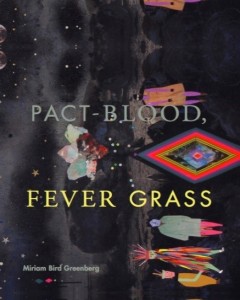31 pages, $10
Review by Chris Caruso
Miriam Bird Greenberg has hitchhiked over ten thousand miles, worked as a deckhand on a catamaran, and is a daughter of a goat raising anthropologist. These life experiences freed her from a topography that defines location and self as fixed and static entities. Her second poetry chapbook, Pact-Blood, Fever Grass, reflects on these themes of location that teeters between the familiar and a visionary quest. I had to sacrifice my belief that I understood the methods of self and place. This collection led me to follow Greenberg and enter her covenant, believing in her powers of divination.
Greenberg plays the role of a backwoods witch, her poems acting as premonitions of what is possible when the constraints of defining are removed. Her poems disrupt the cultural constraints brought about by labeling, and there is a haunting between what is known and what could be known, the plausible and the impossible. “A Problem of Taxonomy” lets a wunderkammer create a “problem/with taxonomy, I tell the kids.” The act of naming and placing what is real against what is fictional allows the logic of sleeping “inside /a cougar to stay warm, or sometimes just a goat/though a cougar is warmer” to exist alongside a grandmother who loved to set off fireworks. The wunderkammer is a box of all possibilities occurring, an unshuffled deck of tarot cards, a potion not yet concocted; it is a device that removes the hierarchy of roles and locations. Within it everything is re-envisioned free of the constraints of defining. Continue reading
![[PANK]](https://pankmagazine.com/wp-content/themes/pank/assets/images/pank-logo-large.png)

